Huawei Mate 30 won't run Android Q, but might use something completely new
Huawei has a rival operating system waiting in the wings


Huawei will launch its own mobile operating system as early as this autumn – cutting its reliance on Google's hugely-successful Android OS entirely, consumer business CEO Richard Yu has told CNBC.
The timeline is not surprising given the recent revelation that Google has suspended all business with Huawei in order to comply with the US government's blacklisting of the company. As a result, Huawei has now lost access to all future updates to the Google-developed version of the open-source Android operating system, including Android Q. Future devices will also be prevented from running the Google Play Store, which offers access to millions of mobile apps, movies, box sets, eBooks, and more.
Huawei wants its Android rival to be a last resort for its successful smartphones. The operating system would roll-out in China first, likely this autumn, before becoming available in markets worldwide in earl 2020, the consumer CEO revealed.
The Google Play Store, Gmail, and other Google services typically found preinstalled in the Android operating system are not found on handsets sold in China, therefore making the transition much less painful for users.
However, it's unclear whether Huawei commands enough brand-loyalty to convince customers to move over to its own operating system – losing access to their favourite apps, as well as any familiarity with the operating system in the process.
Huawei already includes its own Google Play Store rival, dubbed Huawei App Gallery, on its smartphones although it is not the default. Should successors to the likes of the Huawei P30 and Huawei P30 Pro run the Huawei mobile operating system, the Chinese company will have to tempt developers to create entirely new and separate versions of their most popular apps – like Facebook, Instagram, Snapchat, WhatsApp, Spotify, Netflix, Now TV, Trainline, Amazon, Sky and more – to the new store.
This is something Microsoft tried – and failed – to do with Windows Phone. Samsung has also attempted to go it alone a few times: first with its so-called Bada OS, then with TizenOS, which still successfully powers the Galaxy Watch Active and its other wearables. Both Bada OS and TizenOS have been cut from new phone models.
Get all the latest news, reviews, deals and buying guides on gorgeous tech, home and active products from the T3 experts
Whether Huawei has enough clout to succeed where Microsoft failed remains to be seen. However, even if every developer decides to dedicate teams to building a new version of their services that only Huawei users can enjoy – it's going to take time, and these apps are unlikely to be available in less than a years time.
Huawei has insisted that its own operating system would only roll-out if the company is permanently blocked from using Google products.
"We don’t want to do this but we will forced to do that because of the U.S. government. I think the U.S., this kind of thing, will also not only be bad news for us, but also bad news for the U.S. companies because we support the U.S. business, so we will be forced to do this on our own," Richard Yu told CNBC.
"We don’t want to do this but we have no other solution, no other choice."
The autumn release date for the Huawei operating system is interesting since this is typically when the company announces its latest smartphone in the flagship Huawei Mate series. These handsets are typically targeted towards productivity-focused customers, similar to the Samsung Galaxy Note line-up. Huawei is widely-expected to debut its Mate 30 and Mate 30 Pro this autumn. As such, these could be the first to run an entirely-new operating system.

As a former Staff Writer for T3, Aaron writes about almost anything shiny and techie. When he’s not barking orders at Alexa-powered microwaves or gawping at 5G speed tests, Aaron covers everything from smartphones, tablets and laptops, to speakers, TVs and smart home gadgets. Prior to joining T3, Aaron worked at the Daily Express and and MailOnline.